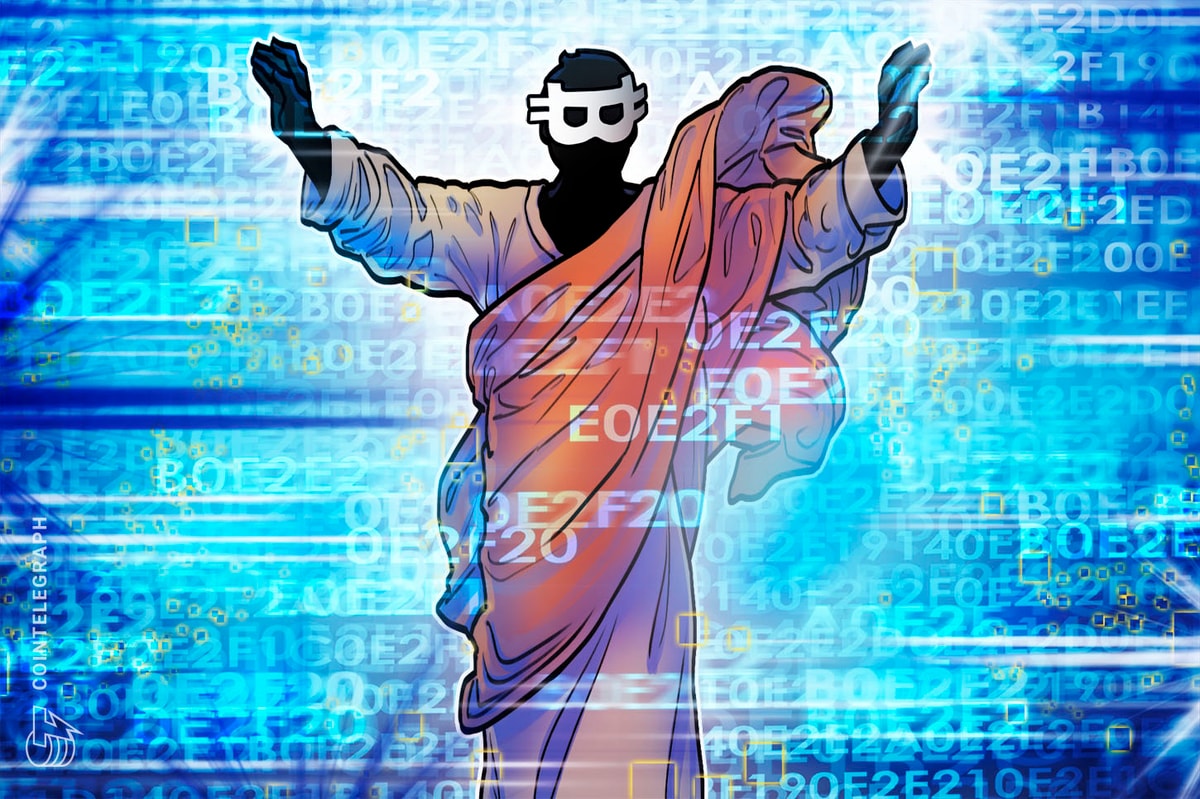ARTICLE AD BOX
The Consensus 2025 speaker says AI can drive blockchain and crypto adoption. Afra Wang meets him.
Apr 24, 2025, 1:45 p.m.
At a time when countless crypto projects are awkwardly pivoting toward artificial intelligence, Eric Winer has spent over a decade building bridges between cutting-edge technology and everyday users. Now, as CTO of NEAR AI, he's pursuing a vision where AI agents negotiate, communicate, and transact on our behalf — a vision that could fundamentally reshape how we interact with the digital world.
Winer speaks with the measured enthusiasm of someone who has repeatedly been early to technological revolutions. Having joined the Winklevoss twins as Gemini's first engineer in 2013 and helped launch one of the earliest NFT marketplaces before the term "NFT" became commonplace, he now confronts what may be his most ambitious challenge: creating a decentralized ecosystem of AI agents that preserves user sovereignty in an increasingly AI-mediated future.
Eric Winer is a speaker at Consensus 2025. This interview has been condensed and lightly edited for clarity.
CoinDesk: You've been in crypto for over a decade now. How did that journey lead you to focusing on AI?
Eric Winer: I've been in the crypto world for 11 years now. Eleven years ago I met the Winklevoss twins through mutual acquaintances. They hired me as the first engineer at Gemini, which was the first regulated Bitcoin exchange in America at the time. Our mission from the CEO was to take this fantastic blockchain technology (really just Bitcoin at the time) and apply some grown-up engineering around it so that it could be effectively adopted by institutions, governments, and people broadly.
Back in 2013-2014, Coinbase was around, but it was kind of a rinky-dink Silicon Valley startup at a time before there was really much of a fintech culture even in California. So it wasn't particularly built well. We were building Gemini in New York City with people who knew how money worked and trying to build not just for cryptography enthusiasts, but for the masses.
I've always been trying to get blockchain technology over the adoption barrier to reach a place where people would be using it, perhaps under the hood, to make the world more efficient and give people more sovereignty, even if they don't know it.
CoinDesk: And that led you to NFTs before most people had even heard the term, right?
Eric Winer: Within Gemini, we acquired a company called Nifty Gateway, which was basically the third NFT startup after OpenSea and CryptoKitties. We launched what was the first NFT marketplace targeted at "normies" in March 2020. It ended up growing by about 1000% month over month for a few months, going from selling a thousand dollars of NFTs to selling a hundred million dollars of NFTs in a day.
This exposed a lot of people to the world of collectibles and art online, right in the middle of the pandemic. From there they got bit by the NFT bug and then by the crypto bug, bringing them into the blockchain ecosystem as a whole.
Personally, I think the promise of NFTs got unfortunately co-opted by the crypto and speculation crowd. Nifty Gateway never used the term "NFT" on its website or in its materials when it launched. We fought against that even becoming what it was called. NFT is just a thing, but online. We were selling art, selling tickets. Having to assign a technical moniker and put that into the public, I think, was actually counterproductive at the end of the day.
CoinDesk: Many crypto projects seem to be awkwardly pivoting toward AI without a clear vision. What makes NEAR AI's approach different?
Eric Winer: Near AI is a fascinating company because the founders of Near actually started by building an AI company. They started as an AI company, trying to train models to write code around 2017-2018. It was a little early for that to be effective at the time.
AGI has always been the vision here. Near AI is less a "crypto x AI" company than it is an AI company that's vision-aligned with the same purpose of Near. Near's vision is for users to own their own data, own their own decision making, not be beholden to corporate, financial, or governmental interests, and be able to decide where their money goes and how their decisions are made.
Whether that's done via a blockchain or done via an AI model, you have to have both. If we don't have a user-owned AI effort going, then we'll lose the game because everybody will start using ChatGPT for everything in their world, and whatever ChatGPT uses for payments is whatever you'll use for payments. Then blockchain loses because you didn't win the AI battle – not the crypto x AI battle, but the real actual AI battle.
Near AI does have interactions with blockchains, including Near, because we think that Near and other blockchains are a good way of doing things. But we're primarily an AI company that sees crypto as a technology; we are not a crypto company trying to shove in AI.
CoinDesk: What exactly does NEAR AI offer as a platform right now?
Eric Winer: Near AI as it exists right now is mostly an agent hosting platform. It's actually one of the easiest ways to get an AI agent running online. You upload some pretty simple Python code or TypeScript code, and boom, it's hosted online with a user interface, embeddable into any website.
It can be backed by any open weights models, although by and large, we delegate the actual model operation to other providers like Fireworks and Anthropic that are out there. The special sauce of our framework is that it makes it easy for those AI agents to talk to other AI agents, whether on our platform or off.
The other thing that isn't live yet, but will be by the time consensus rolls around, is that we are heavily invested in TEEs (Trusted Execution Environments). We think it's very important that you know where your data is going, that it's not being harvested by these models for training, that even us as operators of a cloud system are not able to look at your data, analyze it, or steal it if we wanted. So we're putting all those agents and all the underlying models into these trusted execution environments so that you can use them with confidence.
CoinDesk: Your vision seems to center on AI agents communicating with each other. What does that future look like to you?
Eric Winer: What we're trying to build within Near AI is an ecosystem of AI agents that talk to each other. "AI agent" is a very overloaded term at this point. Most of the time when you see something talking about itself as an AI agent, it's really a set of guidelines and tools for an AI model to act on your behalf. Like, "I've got Llama or Claude or GPT models, and I'm going to instruct it to post on Twitter on my behalf." To do that, it needs the ability to access Twitter and some general guidelines about how to read and post tweets.
But that's not how I necessarily think about agents. I think about agents mostly in terms of how they interact with the rest of the world on your behalf. My AI agent is posting on Twitter, managing my calendar, looking at all my messages and emails, deciding which are spam, which to reply to, which to surface to me – just like an assistant in my life should be.
The future that we envision, which I think is going to happen inevitably, is a world where most of our access to the internet and to the rest of the world is mediated by our personal AI assistants.
CoinDesk: That's a remarkably different vision from most crypto projects. How does it reshape our financial systems?
Eric Winer: If it's my AI agent talking to, say, Amazon's AI agent, and they're going to buy something and negotiate, they're more likely to rationally choose a crypto-based payment method and probably an AI-based dispute resolution method and AI-based credit. We reshape the financial system not by building a better one and trying to convince people to use it, but by building a better one and trying to convince AIs to use it that's easier for AIs and for the people operating them.
I think that's the crypto adoption play now: we build a world of AIs talking to AIs on your behalf, and then we convince the AIs that blockchain and decentralization is a better world for them and for us than the one we've got.
CoinDesk: So in your view, AI could actually be the catalyst that drives blockchain adoption, rather than the other way around?
Eric Winer: I think in the future, and probably not too far in the future, you'll see that vision that everybody seems to want – the super app, the one place you go where everything you do online really becomes an AI assistant. It's giving you a content feed, it's taking action on your behalf, it's spending money on your behalf.
And it's not just doing it alone. It's not just hitting APIs and browsing websites – it's talking to other AI agents. It's also handling your interpersonal, person-to-corporate, or person-to-governmental communications. That needs to be a decentralized ecosystem much like the internet is to some extent a decentralized system, but maybe we can do one better on top of blockchain-based registries.
Afra Wang
Afra Wang is a freelance writer and journalist with working experience in AI and crypto. She previously studied international history at Columbia University and the London School of Economics. Afra writes a newsletter called Concurret, and her personal website can be found at afra.work.

 9 hours ago
2
9 hours ago
2









 English (US) ·
English (US) ·